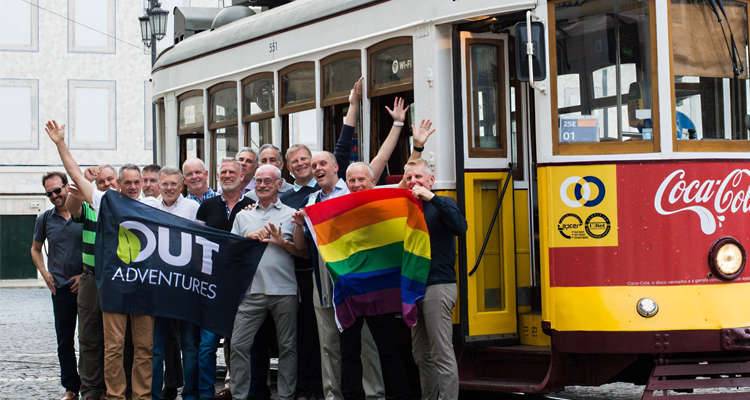

Since the tragic events of 9/11 and the abrupt halt to travel that followed, about every ten years the tourism industry has been knocked back on its heels. The economic meltdown of 2008 and 2009 was even worse on the travel industry than 2001. And the pandemic is a once-a-century calamity exacerbated by the very things that make travel so enriching: large in-person events, meeting new friends at a hotel lounge, slaloming through a crowded bar in a far-flung city.
The travel industry rebooted before, and it will bounce back again soon. And if history is any guide, LGBTQ travelers will be leading the way.
“Gays lead, and the rest follow,” Roger Dow, president and CEO of U.S. Travel Association, says. “They’re adventurous and like new experiences. They have a penchant for travel far greater than their heterosexual counterparts. They travel more and spend more when they travel. They’re the darlings of the travel industry when it comes to spending and dollars.”
“There are a lot of new areas travelers are going to explore,” he continued. “And the gay community will be there first.”
Recent history has demonstrated that LGBTQ travelers — especially those in dual-income, no-child households — are always among the first to travel after social and economic crises. Following 9/11 and again after the 2008–2009 financial crisis, destinations, hospitality companies and travel brands noticed that LGBTQ travelers were prioritizing tourism over other purchase decisions, helping fill airplanes, hotels and restaurants. So, they began to market to this segment in earnest. Smart travel marketers will note that this is happening again now. We see — anecdotally and with the support of research by Community Marketing, Inc., Harris Interactive and IGLTA (International Gay and Lesbian Travel Association) — that this segment travels in higher proportions and intends to book and execute travel in greater numbers than their non-LGBTQ counterparts.
LGBTQ people have also demonstrated a strong affinity for cruises of all sorts, including all-gay or all-lesbian cruises, LGBTQ groups on mainstream cruises, and simply joining mainstream cruises as a same-sex couple or in small friend groups. While cruise vacations are still on a pandemic-induced pause in the U.S., cruise companies — including Carnival, Celebrity, Cunard, Uniworld and the brand-new Virgin Voyages — have all firmly established LGBTQ travelers as a core segment.
“National Travel and Tourism Week takes on special significance this year as we look ahead to recovery following the most challenging year this industry has experienced,” says Christine Duffy, president of Carnival Cruise Line and national chair of the U.S. Travel Association. “Across the country, we are recognizing travel’s value, and the long-standing support of the LGBTQ community will help accelerate our rebound. I know that for Carnival, we pride ourselves on an inclusive atmosphere where every guest is appreciated, and we look forward to welcoming them back as soon as possible.”
One reason queer travelers are uniquely suited to help power the return of travel during this crisis has to do with their decades of experience living under the ever-looming shadow of the HIV/AIDS pandemic, during which they learned the importance of risk mitigation for the good of all. Wearing masks to protect yourself and others resonates with a community that understands the importance of condoms and pre-exposure prophylaxis (PrEP).
According to Randle Roper, co-founder and CEO of VACAYA Full-Ship and Full-Resort LGBT+ Vacations, “[Our] guests showed incredible resilience by traveling safely during the pandemic, and they proved they could adapt to live with health protocols that would keep each other and their loved ones back home safe.”
LGBTQ travelers can show the world how best to support the tourism and hospitality industries in ways that also strengthen their own communities. “LGBTQ consumers have the power to make change and support LGBTQ-friendly companies and destinations by choosing to spend their travel dollars with those that support our community,” says Jeff Guaracino, co-author of the “Handbook of LGBT Tourism and Hospitality. “LGBTQ-owned hotels, bed and breakfasts, tour companies, bars and restaurants, festivals and destinations have been especially hard hit by COVID, and as a community, we can support LGBTQ-owned and friendly businesses and their employees by spending our travel dollars with them first.”
LGBTQ tour companies and travel agents have a direct connection to queer travelers and report strong interest in and bookings of travel. According to Robert Sharp, co-founder and CEO of Out Adventures, “After [releasing] our entire tour schedule through the end of 2022, we saw our largest month of sales in our 12-year history.”
Kelli Carpenter, co-founder of R Family Vacations, adds, “Our highest sales have come from our river cruise products and international tour business, showing that travelers are ready to explore the world again.”
VACAYA’s Roper has seen extremely robust sales over the past several months — including selling out their Antarctica Cruise. “With a starting price of around $25,000 per room, that was our best sign yet that our community members are ready to break free from their cages and return to travel,” he says.
Robert Geller, founder of FabStayz, agrees: “Pent-up demand is visible, palpable and quantifiable.”
NYC-based Ed Salvato is a freelance travel writer, instructor at NYU and the University of Texas at Austin’s NYC Center, and an LGBTQ tourism marketing consultant.